This is deadly. The law firm Milbank Tweed sponsored many pro-Israel events at Columbia Law School and a session on CIA torture, too, with its name plastered all over these events, and there was no problem– but it blew a gasket and reportedly asked for its money back from Harvard Law School because an event last October was pro-Palestine and had Milbank’s name on it, thanking the firm for its support.
Check out the evidence of Milbank sponsorship of Israeli leaders and of the CIA torture session, at Columbia Law. I got the screenshots from a public letter sent by Columbia law professor Katherine Franke to Milbank yesterday.
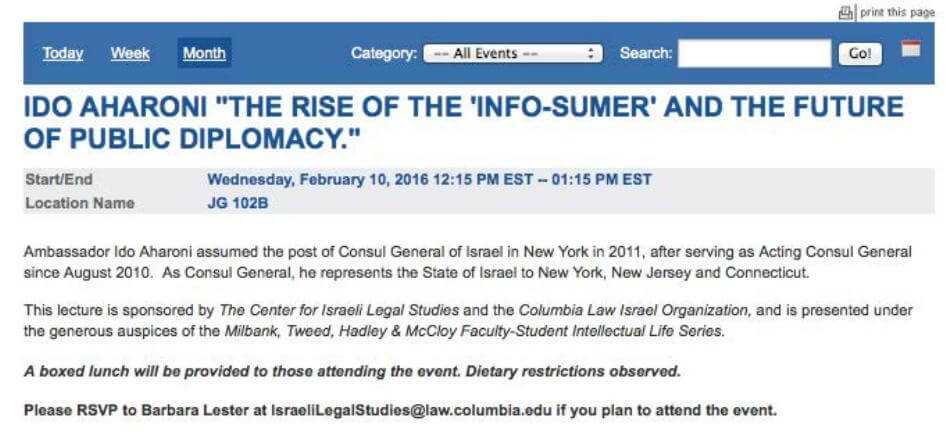
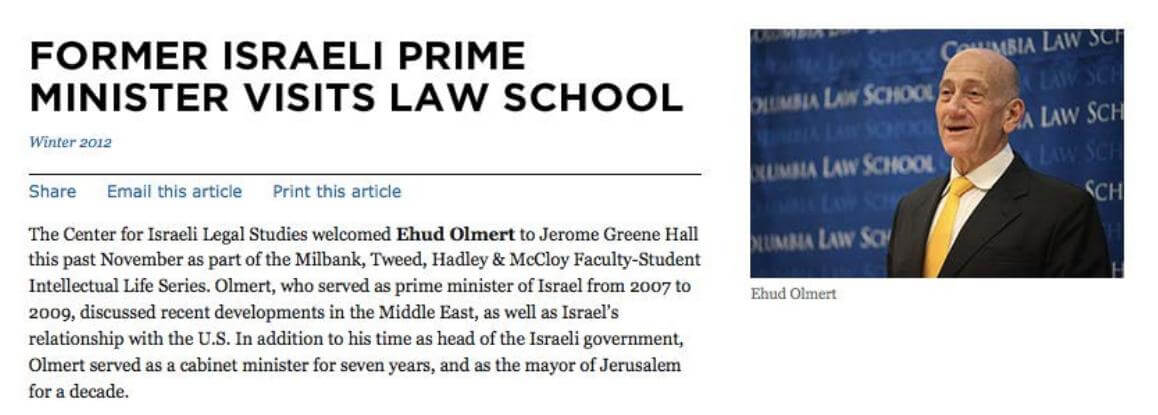
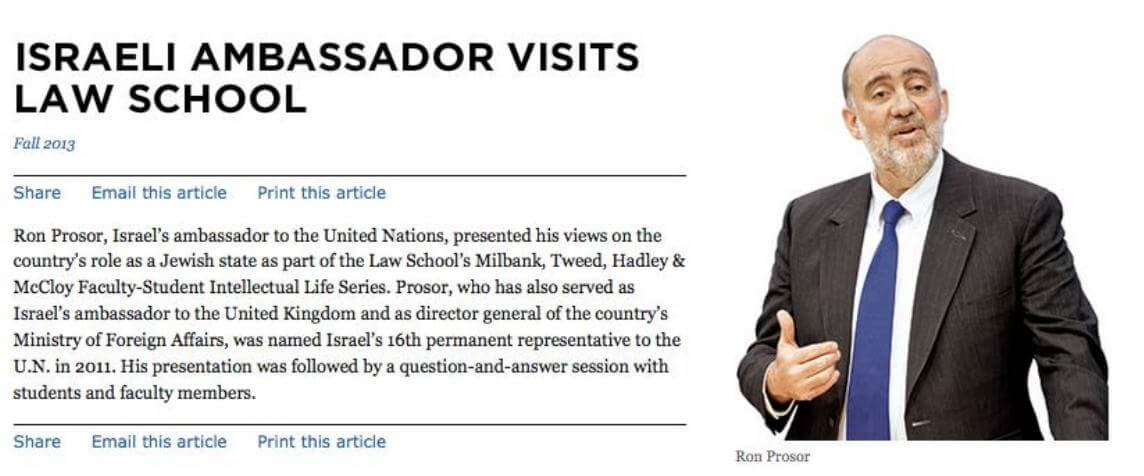
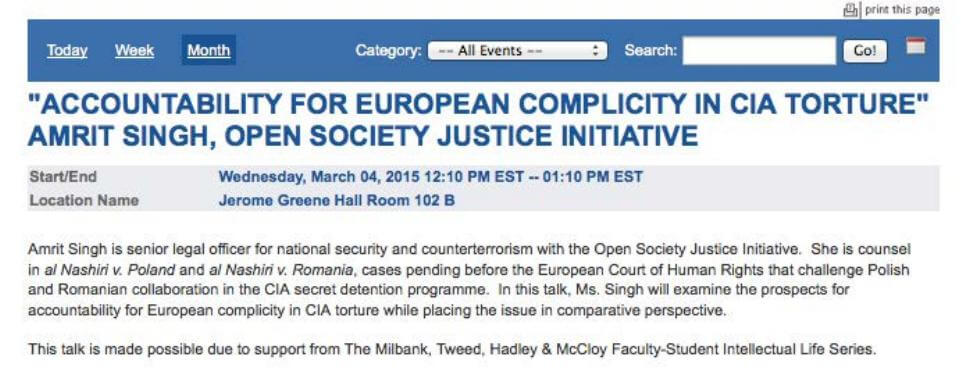
So let’s be clear about the Establishment values here. It’s fine to criticize the CIA for torture and demand accountability at a leading law school, it’s also fine to promote the heck out of Israel; but one word in favor of Palestinians, and it’s a major scandal, initiated by pressure groups to whom a leading law firm is responsive. This is why I believe that the Israel lobby is more powerful than the national interest crowd.
Here’s the back story. Over the last week we (and the New York Times and Harvard newspapers) have covered the donor blackmail issued by the Milbank law firm to Harvard Law School over the fact that $500 of a million-dollar gift was used to buy pizza and fixins for a Palestinian solidarity event at the school last year, ironically titled “The Palestine Exception to Free Speech.” Harvard Law School and Milbank were pressured by a pro-Israel group. Milbank folded, asked for its money back. The student group “HLS Justice for Palestine” was compelled to remove the name Milbank from its event.
Three days ago, we ran a letter from several professors (and other members of the law school community) to Milbank decrying its censorious conduct.

Milbank doesn’t like the publicity. So what follows is an exchange of letters between Thomas A. Arena, a Milbank partner responding to the professors who signed that letter, and one of the professors, Katherine Franke, Sulzbacher Professor of Law at Columbia University and director of the Center for Gender & Sexuality Law.
In that exchange, Arena says Milbank won’t sponsor “statements accusing governments of violating international law and other persons and institutions of engaging in wrongful or harmful conduct.” Franke points out, “this is the kind of discussion we hold at our law schools all the time.”
She sent Arena a bunch of screenshots of events Milbank sponsored, without a problem. She noted: “Many of these events included ‘statements accusing governments of violating international law and other persons and institutions of engaging in wrongful or harmful conduct.’”
Franke then states the principle at work here: “It is difficult not to be left with the impression that the decision to withdraw funding from Harvard Law students’ events in this case was related to the fact that this event might raise criticisms of Israeli state policy relative to the Palestinians.”
First the Milbank letter:
February 23
Dear Professors:
Your open letter, relying on allegations in press reports, erroneously suggests that Milbank sought to “censor or influence the viewpoints being expressed at student-run events” and that Milbank threatened to terminate its five-year pledge to Harvard Law School. As Harvard Law School has publicly stated, the allegations are not accurate.
Here is what did happen. In 2012, Milbank agreed to establish the Milbank Tweed Student Conference Fund at the Law School. The Fund called for Milbank to make a substantial gift, spread out over five years, to broadly support the school’s student journals and organizations.
The Office of the Dean of Students at the Law School administered the Fund through an application process open to all student organizations and journals, and the Dean of the Law School and the Dean of Students had sole discretion to determine how to allocate monies from the Fund. Milbank had no input whatsoever into the selection of student organizations or journals to receive grants from the Fund.
For the current school year, Harvard awarded grants from the Fund to dozens of student organizations. Although Milbank was pleased to support student-run organizations and journals at the Law School, the awarding of grants from the Fund by Harvard was never intended to constitute or imply an endorsement of the viewpoints expressed by any particular organization or journal. Milbank is a diverse organization, comprised of partners and employees with varying points of views on many issues. We are extremely proud of that diversity in opinions. Consistent with that diversity, while individuals at the firm are free to express their political views, the firm does not take political positions or endorse particular political views.
In October 2015, a Harvard student organization used a grant from the Fund to sponsor an event entitled, “The Palestinian Exception to Free Speech.” We became aware of the event when the sponsoring student organization posted a Facebook page to promote it. The Facebook page contained a controversial image and included statements accusing governments of violating international law and other persons and institutions of engaging in wrongful or harmful conduct. The sponsoring group, without consulting the firm, also included a statement that the event “is brought to you by the generous support of Milbank LLP,” which created a false impression, among many who viewed it, that the firm endorsed the views expressed by the group. At the request of the Law School, the sponsoring student organization removed the statement relating to Milbank from its Facebook page about the event.
Milbank has not terminated its five-year gift or its support for the Law School, and never threatened to do so. Nor did Milbank demand that any funding previously provided to any Harvard student group be rescinded. Nor did Milbank demand that Harvard withhold funds from the student group in question or any other group.
In light of the false impression engendered by the Facebook page noted above, however, we did make the decision to look for alternative ways to support the Law School. Our motivation was solely to avoid the risk of future misimpressions that the firm endorses specific viewpoints expressed by any particular student organization or journal. The Law School assured us that it would be able to fund student conferences with other resources, and we understand that the Law School has continued to maintain the same level of funding to support student activities.
Milbank looks forward to maintaining our strong relationship with the Law School and to continuing to support its mission in other ways in the future.
Thomas A. Arena
Milbank, Tweed, Hadley & McCloy LLP
And here is the response from Professor Franke:
Katherine M. Franke
Isidor and Seville Sulzbacher Professor of Law
Director, Center for Gender & Sexuality LawFebruary 26, 2016
Dear Mr. Arena:
Thank you very much for contacting us about our February 22, 2016 Open Letter, signed by law faculty, students, administrators and staff raising concerns about actions taken by Milbank at Harvard Law School. I am grateful to you for responding directly to us about our concerns.
Our letter was prompted by Milbank’s decision to discontinue a pre-existing pledge of financial support for student events once it learned that funds from the “Milbank Tweed Student Conference Fund” had been made available to cover expenses for a student-run event entitled “The Palestinian Exception to Free Speech.” These facts, which we set out in our open letter, are confirmed in your message to us of February 23, 2016.
Your letter offers a general defense of Milbank’s actions, but does not deal directly with the concerns we raised. (For reasons unknown to us, your letter also misattributes assertions to us that may have been raised by other critics. For instance, we did not write, as you assert, that Milbank “threatened to terminate its five-year pledge to Harvard Law School.”) In any event, we remain concerned about the timing of the firm’s decision to defund the “Milbank Tweed Student Conference Fund” and the potential these actions have to chill speech at Harvard and at law schools across the country.
Specifically, we aimed to take issue with the following:
1. That Milbank instructed Harvard Law School to discontinue the “Milbank Tweed Student Conference Fund” after a student group held an event on “The Palestinian Exception to Free Speech.” As a general principle of free speech and democratic principles, we support the notion that controversial speech should be met with more opportunities for speech, not tactics that aim to or have the effect of defunding the fora in which robust speech can be supported without penalty for particular viewpoints being expressed.
2. That the content of the event prompted the discontinuance of funding; content that you characterize as including “statements accusing governments of violating international law and other persons and institutions of engaging in wrongful or harmful conduct.” Even if this characterization of the event is correct, this is the kind of discussion we hold at our law schools all the time, and we actively encourage students to engage is spirited debate about the legality and legitimacy of state and non-state actors. Columbia Law School’s Human Rights Institute, for example, regularly sponsors programs of this nature, as complex issues of accountability for human rights violations across the globe lie at the core of the Institute’s research, teaching, and advocacy work. In fact, Milbank has funded numerous events at Columbia Law School that raise precisely these kinds of challenging and contested questions. It is difficult not to be left with the impression that the decision to withdraw funding from Harvard Law students’ events in this case was related to the fact that this event might raise criticisms of Israeli state policy relative to the Palestinians.
3. Your view that the way the student group referred to Milbank on their event page was somehow inappropriate, or a sufficient reason to withdraw funding for student groups generally, and that it reasonably created the impression that Milbank supported the opinions expressed at the event. The Facebook event page for this student-run panel included the text: “brought to you by the generous support of Milbank LLP.” As we understand it, every student event that received funding from the “Milbank Tweed Student Conference Fund” was required, as a condition of receipt of funding, to include this or similar language on their flyers acknowledging Milbank’s financial support. Your concern that this language might create “a false impression, among many who viewed it, that the firm endorsed the views expressed by the group,” strikes us as unfounded. General funds to a law school to support student events are common, and it is widely understood that the funder gives their support to student groups and the organization of events as such, and not the support of opinions expressed by any particular student group or speaker. This is particularly so when the specific event funding decisions are made by law school staff with no involvement of the firm. Centers and institutes and universities “support” and “sponsor” events every day, and it is widely understood that they do so with the intention of promoting speech, informed debate, and education, and not only to promote opinions with which they entirely agree. In any event, we suggest that Milbank could simply have suggested that for all future events, an amended reference be included to state explicitly that Milbank provided funding for the event by did not necessarily endorse views expressed.
I enclose screenshots of events held at Columbia Law School in recent years that were supported by funding from Milbank. Many of them include a courtesy acknowledgement at the bottom identical to that which accompanied the student event at Harvard Law School: This program is made possible by the generous support of Milbank, Tweed, Hadley & McCloy LLP. Other events include similar language: Co-Sponsored by Milbank, Tweed, Hadley & McCloy Faculty-Student Intellectual Life Series. Yet no objection from Milbank similar to that raised at Harvard has been lodged in connection with events at Columbia for which a Milbank fund provided support. Many of these events included “statements accusing governments of violating international law and other persons and institutions of engaging in wrongful or harmful conduct.”
I would be more than happy to meet with you and any of your colleagues at Milbank to discuss the nature of our concerns, and steps Milbank might consider to address these concerns. As we stated in our Open Letter, the discontinuance of Milbank funding for student events at Harvard Law School, even as described by the firm in its defense, raises troubling issues about the ethical obligations of significant donors to avoid actions that may undermine the principle of free speech and debate in the law school context. The fact that the donor in question here is a large law firm for whom many law students would like to work after graduation is of even greater concern.
Sincerely,
Katherine M. Franke
Some of the screenshots are above, and below.
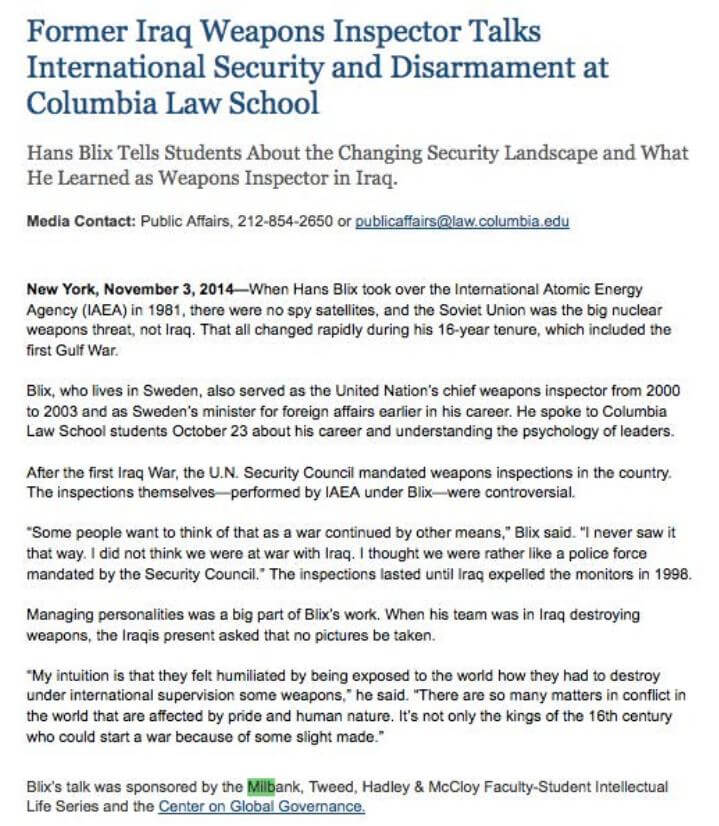
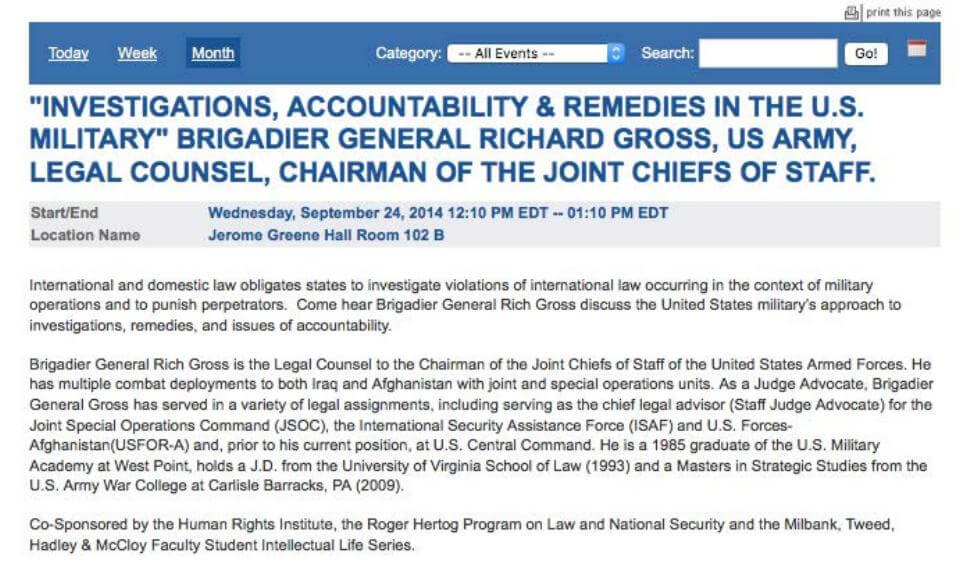
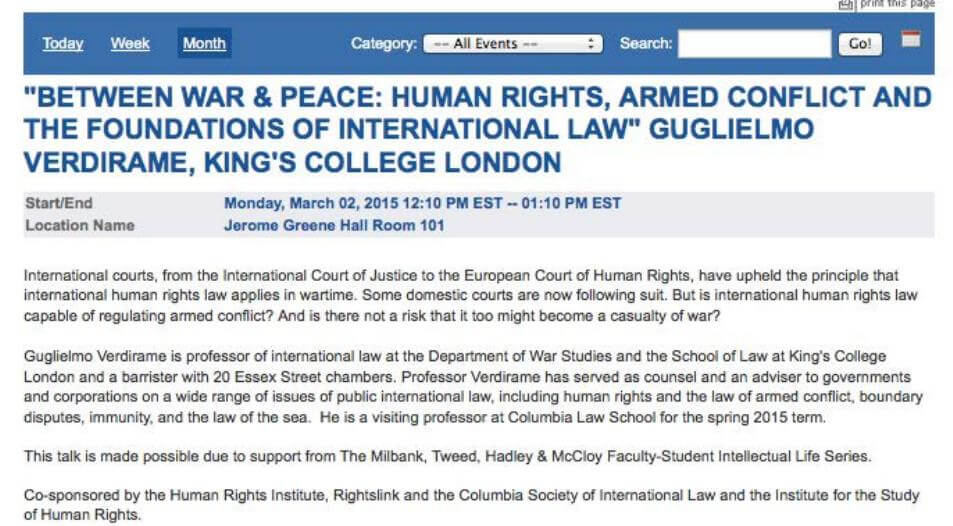



Maybe off-topic, maybe not. It was reported in the news a few days ago that Beijing just surpassed New York City as having the top number of billionaires. Both cities have more than 500 resident billionaires.
While many donors give out of the kindness of their hearts or to encourage other people to give to a cause near and dear to them, some donors do give with the thought of the benefits to themselves or their business of having their name associated with a prestigious organization, like Harvard Law School. Establishing a student activity fund would assure that the firm’s name would appear several times a year attached to cutting edge intellectual and political issues, which is good publicity for a law firm. Quite possibly Milbank acted out of concern that having their name associated with Palestinian rights might scare away wealthy Zionist clients. Their heavy-handed action has only drawn national attention to their firm — in a way that may turn off other wealthy clients.
About Arena’s letter, the less said the better.
But re: Franke’s letter, and I’ve made this comment before: why are letters such as these always so long-winded. You see this again and again. Make your point, sign off.
Zionism 101:
The (Pro-) Israeli version of free speech: Silence (Pro-) Palestinians.
Exactly! Refusing to see this can only be ideological blindness.
They make up such dumb, obviously false excuses to avoid saying the obvious: that they don’t want to support the Palestinian struggle for justice in any way. Why don’t they just admit it, just come out and say what they believe in? Are they ashamed of it? I guess so.